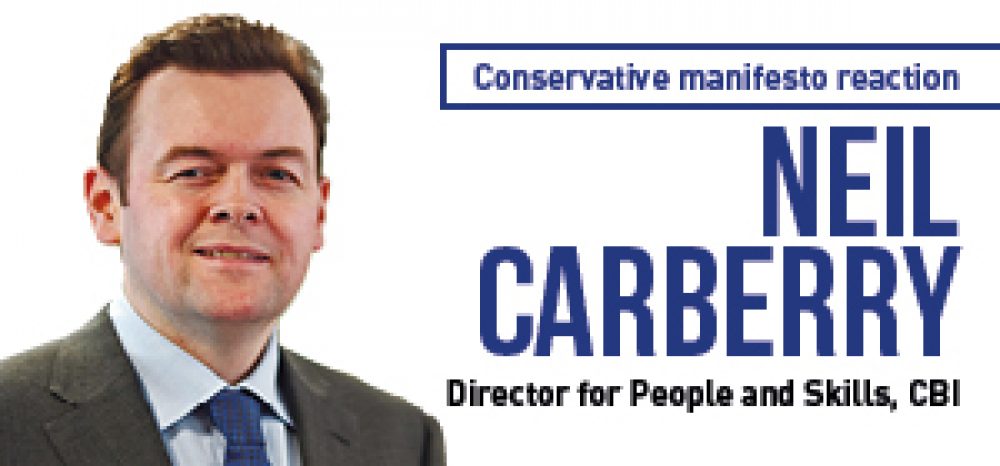Conservative manifesto pledge: Allow employers to use their levy to pay apprentices’ wages
Neil Carberry argues FOR
The Conservative manifesto pledge to allow firms access to levy funding to cover wage costs for some forms of training came as a surprise – and we certainly shouldn’t read too much into one line, in what was a long and complex manifesto.
But the commitment – and other commitments to levy flexibility in manifestos from many of the parties – represents a change from the debate of the past two years.

Parties seem to have worked out that the challenge in delivering real change in the English skills system is not primarily about where the money comes from. Instead, it’s about the incentives at work in the system and how we encourage the growth of high quality provision.
Delivering great training should always be the best option for levy payers – and without changes to the system as set out in 2015, that wasn’t going to happen.
This is a trend that we should welcome. For too long, English skills policy has been stuck on a two-year cycle of new policy and too little time for delivery. The new approach to standards, coupled with levy funding, has the potential to change that.
As I set out a couple of weeks ago in FE Week, stability in this system is essential to long-term investment by employers, confidence amongst providers and belief in the value of technical and professional routes amongst potential learners.
Delivering great training should always be the best option
We know that there are big challenges to face, so the approach should evolve over time. Manifestos can reflect that, as they look to 2022. Among the key issues are effective quality control and learner protections. Likewise, the standards approval process needs to quicken and become more interlinked. These are big jobs for the new Institute for Apprenticeships.
But there is more to evolving the system for success than this. At present, there is still a strong sense amongst many businesses that the long-promised focus on genuine skills needs has not followed the imposition of a significant new payroll tax in the way that they had hoped. Globally, training levies are generally designed to be reclaimable in full by employers who do the right thing. Yet we started building a system where those who don’t play – or who game the system – are not necessarily worse off.
The answer to this is to ensure firms can reclaim more of the real costs of providing high quality training that focuses on improved outcomes for learners – not just participation. As the CBI has said repeatedly since 2015, that should start with a better reflection of the cost/benefit position firms face when making investment decisions about training.
Up until now, government has stuck to a simplistic definition of employer cost: training cost is only training cost if it is charged for by a provider for off-the-job training on an apprenticeship. This may sound great in Whitehall, but it is nonsense for businesses in Walsall, and across the country. It is not a model into which one can hammer the entirety of what firms do to support good learning – and it sets up perverse incentives that limit the impact of the policy.
The CBI has always been clear that this needs to change, to take account of things like senior staff time spent supporting training, capital costs for equipment in training centres, or an ability to support other firms with your levy. While we might not have chosen learner salary cost as our first priority, the Conservative proposal at least shows that parties are thinking about repairing the mistakes of 2015.
If accompanied by good standards of quality control and learner protection, more levy flexibility is a change to be welcomed, and will help build a higher performing system.
Neil Carberry is Director for People and Skills at the CBI








Good article. I agree that the true cost of an apprenticeship is not the sum paid to the provider but the cost to the business in wages and lost productivity.
Interesting to read that the conservative proposal demonstrates that they are thinking about “repairing the mistakes of 2015”. Who introduced the levy?